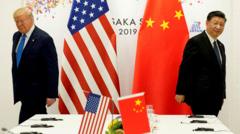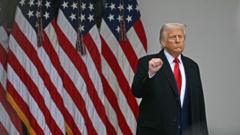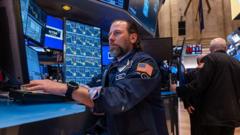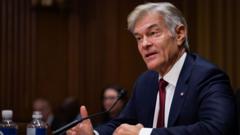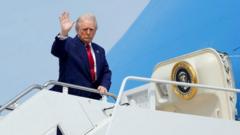The European Union faces significant trade challenges as U.S. tariffs threaten its market access, prompting a reevaluation of relations with China while weighing risks of dependency and conflict.**
EU Navigates Trade Turbulence Amid U.S. Tariff Strikes**

EU Navigates Trade Turbulence Amid U.S. Tariff Strikes**
As President Trump's tariffs loom, the EU finds itself at a crossroads, balancing potential partnerships with China against longstanding tensions.**
The European Union (EU) is currently navigating uncertain trade dynamics as ongoing tariffs imposed by President Trump jeopardize access to the U.S. market, the world's largest consumer base. This shift has compelled EU businesses to explore new opportunities, with China emerging as a potential partner despite a history of tensions.
Despite being the second-largest consumer market globally, the EU cannot ignore the compelling statistics that position China as an appealing alternative. However, relations between the EU and China have not been smooth; Europe has frequently criticized China for engaging in practices such as overproduction and the dumping of products at reduced prices. Additionally, China's political actions, particularly in relation to the war in Ukraine, have drawn ire from European leaders.
Faced with the prospect of 20% tariff increases on imports to the U.S., along with rates exceeding 50% on certain goods from China, analysts suggest that the current trade situation could inadvertently bring the two economies closer together—a dramatic shift in the geopolitical landscape aimed to counteract America's push to weaken China's influence.
Recent developments hint at a thaw in relations, as the EU enacted higher tariffs on electric vehicles from China last year. However, following discussions, China has expressed a willingness to resume negotiations on electric vehicle supply chains, with EU representatives signaling an openness to reevaluate pricing structures.
Despite these positive signals, caution is warranted. As China's access to American consumers dwindles, EU members may find themselves inundated with cheaper goods, raising fears of market dumping and exacerbating tensions over various issues. The potential for deterioration in EU-China relations remains high, making this a pivotal moment that could shape the future of global trade patterns.
Theresa Fallon, an analyst at the Center for Russia, Europe, Asia Studies, remarked on the precarious position Europe finds itself in, a testament to the complex interplay of tariffs, trade, and international relations in this evolving economic landscape.
Despite being the second-largest consumer market globally, the EU cannot ignore the compelling statistics that position China as an appealing alternative. However, relations between the EU and China have not been smooth; Europe has frequently criticized China for engaging in practices such as overproduction and the dumping of products at reduced prices. Additionally, China's political actions, particularly in relation to the war in Ukraine, have drawn ire from European leaders.
Faced with the prospect of 20% tariff increases on imports to the U.S., along with rates exceeding 50% on certain goods from China, analysts suggest that the current trade situation could inadvertently bring the two economies closer together—a dramatic shift in the geopolitical landscape aimed to counteract America's push to weaken China's influence.
Recent developments hint at a thaw in relations, as the EU enacted higher tariffs on electric vehicles from China last year. However, following discussions, China has expressed a willingness to resume negotiations on electric vehicle supply chains, with EU representatives signaling an openness to reevaluate pricing structures.
Despite these positive signals, caution is warranted. As China's access to American consumers dwindles, EU members may find themselves inundated with cheaper goods, raising fears of market dumping and exacerbating tensions over various issues. The potential for deterioration in EU-China relations remains high, making this a pivotal moment that could shape the future of global trade patterns.
Theresa Fallon, an analyst at the Center for Russia, Europe, Asia Studies, remarked on the precarious position Europe finds itself in, a testament to the complex interplay of tariffs, trade, and international relations in this evolving economic landscape.

